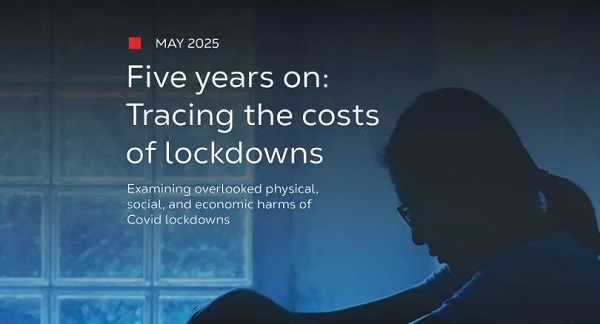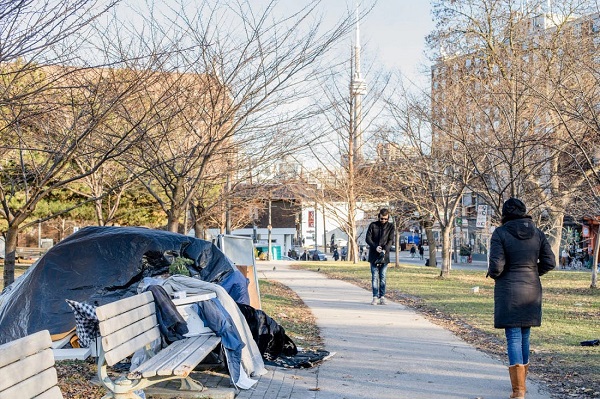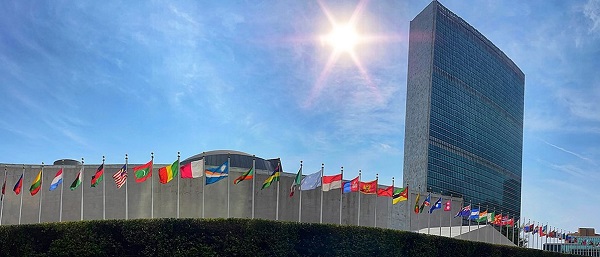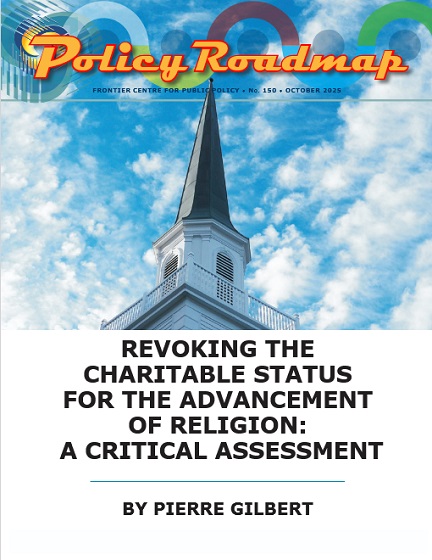Addictions
New Report – Five years on: Tracing the costs of lockdowns

In 2019, 67 percent of Canadians rated their mental health as “very good or excellent.” By 2023, that figure had dropped to just 54 percent.
A new report from the Justice Centre for Constitutional Freedoms examines the immediate and long-term negative impacts of Covid lockdowns, including physical, social, and economic harms. It also underscores the lack of transparent, evidence-based analysis by governments to justify these measures.
The report details how policies introduced with the stated goal of saving lives came at an extraordinary cost to Canadians’ mental and physical health, access to healthcare, economic security, and civil liberties.
One of the most concerning findings is the sharp decline in Canadians’ mental health. In 2019, 67 percent of Canadians rated their mental health as “very good or excellent.” By 2023, that figure had dropped to just 54 percent.
Meanwhile, the number of Canadians reporting “fair or poor” mental health nearly doubled—from 8 percent to 15 percent. This trend was seen across all age groups, but especially among young adults.
Indeed, despite facing minimal risk from Covid, young Canadians suffered some of the most serious consequences of lockdown measures. Non-Covid deaths among Canadians under age 45 rose by 22 percent, driven by factors such as disease, addiction, delayed treatment, and suicide. Physical activity among youth dropped significantly during this period, while time spent on screens—such as cell phones, computers, and tablets—increased sharply. Up to 70 percent of children and teens reported experiencing anxiety, depression, or other serious mental health issues.
A particularly alarming trend was the surge in opioid-related deaths. From 2020 to 2023, annual opioid overdose deaths increased by 108 percent. In 2023 alone, 8,606 Canadians died from opioid toxicity—more than double the pre-lockdown average. British Columbia, Alberta, and Ontario recorded the highest rates, with the vast majority of deaths involving fentanyl.
During Covid, thousands of medical check-ups, diagnoses, and treatments were delayed or cancelled, resulting in a serious and ongoing backlog in Canada’s healthcare system.
Wait times for medical treatments increased by 43 percent between 2019 and 2024, reaching a median of 30 weeks. MRI wait times rose by 55 percent. For certain cancers, including breast and prostate, surgery delays increased by as much as 34 percent. Since 2018, more than 74,000 Canadians have died while waiting for surgery or diagnostic care—over 15,000 of them in 2023–24 alone. The actual number is likely higher, due to poor provincial tracking and reporting.
The economic impact was equally severe. Lockdowns resulted in widespread job losses, particularly among low-wage workers, while the “laptop class” remained largely unscathed. While many public sector jobs expanded during this time, Canadians in hospitality, retail, and service sectors faced prolonged unemployment. The expansion of public spending and government debt contributed to rising inflation, driving up the cost of food, housing, and other essentials.
Crime rates also rose during the lockdown years. Homicides peaked in 2022 at 17 percent above trend, with 882 victims across Canada. Cybercrime nearly doubled, rising from 48,000 cases in 2019 to over 93,000 in 2023. Identity theft and fraud increased to 120 percent above trend in 2020, with similar levels in the following years. Particularly troubling was the rise in online child sexual exploitation, which reached 18,650 reported cases in 2023—a 173 percent increase from 2019.
Benjamin Klassen, Education Coordinator at the Justice Centre, says the findings demand accountability. “This report calls for governments to take responsibility for the damage done during this period and ensure that future public health policies uphold the Charter rights and freedoms of all Canadians.”
Mr. Klassen continues, “The Charter requires governments to ‘demonstrably’ justify any freedom-limiting policy. To date, no federal or provincial government in Canada has conducted the kind of comprehensive impact assessment required to justify the lockdowns.”
He concludes, “The evidence is clear: the harms of lockdowns outweighed their benefits. Canadians deserve an honest and transparent evaluation of lockdown harms, so that these mistakes are never repeated.”
Addictions
BC premier admits decriminalizing drugs was ‘not the right policy’

From LifeSiteNews
Premier David Eby acknowledged that British Columbia’s liberal policy on hard drugs ‘became was a permissive structure that … resulted in really unhappy consequences.’
The Premier of Canada’s most drug-permissive province admitted that allowing the decriminalization of hard drugs in British Columbia via a federal pilot program was a mistake.
Speaking at a luncheon organized by the Urban Development Institute last week in Vancouver, British Columbia, Premier David Eby said, “I was wrong … it was not the right policy.”
Eby said that allowing hard drug users not to be fined for possession was “not the right policy.
“What it became was a permissive structure that … resulted in really unhappy consequences,” he noted, as captured by Western Standard’s Jarryd Jäger.
LifeSiteNews reported that the British Columbia government decided to stop a so-called “safe supply” free drug program in light of a report revealing many of the hard drugs distributed via pharmacies were resold on the black market.
Last year, the Liberal government was forced to end a three-year drug decriminalizing experiment, the brainchild of former Prime Minister Justin Trudeau’s government, in British Columbia that allowed people to have small amounts of cocaine and other hard drugs. However, public complaints about social disorder went through the roof during the experiment.
This is not the first time that Eby has admitted he was wrong.
Trudeau’s loose drug initiatives were deemed such a disaster in British Columbia that Eby’s government asked Trudeau to re-criminalize narcotic use in public spaces, a request that was granted.
Records show that the Liberal government has spent approximately $820 million from 2017 to 2022 on its Canadian Drugs and Substances Strategy. However, even Canada’s own Department of Health in a 2023 report admitted that the Liberals’ drug program only had “minimal” results.
Official figures show that overdoses went up during the decriminalization trial, with 3,313 deaths over 15 months, compared with 2,843 in the same time frame before drugs were temporarily legalized.
Addictions
Canada must make public order a priority again

A Toronto park
Public disorder has cities crying out for help. The solution cannot simply be to expand our public institutions’ crisis services
[This editorial was originally published by Canadian Affairs and has been republished with permission]
This week, Canada’s largest public transit system, the Toronto Transit Commission, announced it would be stationing crisis worker teams directly on subway platforms to improve public safety.
Last week, Canada’s largest library, the Toronto Public Library, announced it would be increasing the number of branches that offer crisis and social support services. This builds on a 2023 pilot project between the library and Toronto’s Gerstein Crisis Centre to service people experiencing mental health, substance abuse and other issues.
The move “only made sense,” Amanda French, the manager of social development at Toronto Public Library, told CBC.
Does it, though?
Over the past decade, public institutions — our libraries, parks, transit systems, hospitals and city centres — have steadily increased the resources they devote to servicing the homeless, mentally ill and drug addicted. In many cases, this has come at the expense of serving the groups these spaces were intended to serve.
For some communities, it is all becoming too much.
Recently, some cities have taken the extraordinary step of calling states of emergency over the public disorder in their communities. This September, both Barrie, Ont. and Smithers, B.C. did so, citing the public disorder caused by open drug use, encampments, theft and violence.
In June, Williams Lake, B.C., did the same. It was planning to “bring in an 11 p.m. curfew and was exploring involuntary detention when the province directed an expert task force to enter the city,” The Globe and Mail reported last week.
These cries for help — which Canadian Affairs has also reported on in Toronto, Ottawa and Nanaimo — must be taken seriously. The solution cannot simply be more of the same — to further expand public institutions’ crisis services while neglecting their core purposes and clientele.
Canada must make public order a priority again.
Without public order, Canadians will increasingly cease to patronize the public institutions that make communities welcoming and vibrant. Businesses will increasingly close up shop in city centres. This will accelerate community decline, creating a vicious downward spiral.
We do not pretend to have the answers for how best to restore public order while also addressing the very real needs of individuals struggling with homelessness, mental illness and addiction.
But we can offer a few observations.
First, Canadians must be willing to critically examine our policies.
Harm-reduction policies — which correlate with the rise of public disorder — should be at the top of the list.
The aim of these policies is to reduce the harms associated with drug use, such as overdose or infection. They were intended to be introduced alongside investments in other social supports, such as recovery.
But unlike Portugal, which prioritized treatment alongside harm reduction, Canada failed to make these investments. For this and other reasons, many experts now say our harm-reduction policies are not working.
“Many of my addiction medicine colleagues have stopped prescribing ‘safe supply’ hydromorphone to their patients because of the high rates of diversion … and lack of efficacy in stabilizing the substance use disorder (sometimes worsening it),” Dr. Launette Rieb, a clinical associate professor at the University of British Columbia and addiction medicine specialist recently told Canadian Affairs.
Yet, despite such damning claims, some Canadians remain closed to the possibility that these policies may need to change. Worse, some foster a climate that penalizes dissent.
“Many doctors who initially supported ‘safe supply’ no longer provide it but do not wish to talk about it publicly for fear of reprisals,” Rieb said.
Second, Canadians must look abroad — well beyond the United States — for policy alternatives.
As The Globe and Mail reported in August, Canada and the U.S. have been far harder hit by the drug crisis than European countries.
The article points to a host of potential factors, spanning everything from doctors’ prescribing practices to drug trade flows to drug laws and enforcement.
For example, unlike Canada, most of Europe has not legalized cannabis, the article says. European countries also enforce their drug laws more rigorously.
“According to the UN, Europe arrests, prosecutes and convicts people for drug-related offences at a much higher rate than that of the Americas,” it says.
Addiction treatment rates also vary.
“According to the latest data from the UN, 28 per cent of people with drug use disorders in Europe received treatment. In contrast, only 9 per cent of those with drug use disorders in the Americas received treatment.”
And then there is harm reduction. No other country went “whole hog” on harm reduction the way Canada did, one professor told The Globe.
If we want public order, we should look to the countries that are orderly and identify what makes them different — in a good way.
There is no shame in copying good policies. There should be shame in sticking with failed ones due to ideology.
Our content is always free – but if you want to help us commission more high-quality journalism,
consider getting a voluntary paid subscription.
-

 Agriculture2 days ago
Agriculture2 days agoIs the CFIA a Rogue Agency or Just Taking Orders from a Rogue Federal Government?
-

 Business2 days ago
Business2 days agoJudges are Remaking Constitutional Law, Not Applying it – and Canadians’ Property Rights are Part of the Collateral Damage
-

 Red Deer2 days ago
Red Deer2 days agoYour last minute election prep: Common Sense Red Deer talks to the candidates
-

 Business2 days ago
Business2 days agoTrump Admin Blows Up UN ‘Global Green New Scam’ Tax Push, Forcing Pullback
-

 Business2 days ago
Business2 days agoTrump Blocks UN’s Back Door Carbon Tax
-

 Daily Caller2 days ago
Daily Caller2 days agoTrump urges Putin, Zelenskyy to make a ‘deal’
-

 espionage2 days ago
espionage2 days ago“Suitcase of Cash” and Secret Meeting Deepen Britain’s Beijing Espionage Crisis
-

 Energy11 hours ago
Energy11 hours agoMinus Forty and the Myth of Easy Energy







